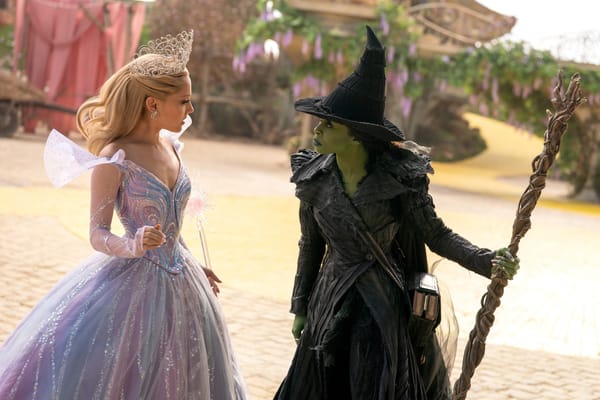Twilight of the Blue Checks
On the meaning behind Twitter's verified badge.

Twitter (the company and the website) is having a meltdown right now.
It’s astonishing the rate at which news is happening around the company. Elizabeth Lopatto from The Verge has a great summary of everything. So does Charlie Warzel at The Atlantic. And Mike Masnick from TechDirt explains why the days ahead for the company are pretty treacherous when it comes to its relationship to the FTC. It really feels like the end-of-days and that the site might be collapsing in real time.
From a features perspective, the big news is that days after rolling out the option for anyone to get the blue “verified” checkmark next to their name, the company has now rolled it back in order to figure out how best to fight the rampant impersonation that’s happening on the platform right now. By the time you’re reading this, the program will probably be in a different state! See the below threads for some of the mayhem that’s been going on.
The verified brand situation is getting out of control. Quick thread of twitter blue brands, and brands who might be pissed off at Elon right about now.
— Read Jackson Rising by @CooperationJXN (@JoshuaPHilll) 2:49 AM ∙ Nov 11, 2022
Did Twitter Blue tweet just cost Eli Lilly $LLY billions?
— Rafael Shimunov is on Mastodon (@rafaelshimunov) 6:20 PM ∙ Nov 11, 2022
Yes.
It feels like Elon has devoted a lot of energy towards correcting perceived injustices around Twitter’s verification system (which previously conferred a blue/white check on a user’s profile page), but in a poorly-thought-out way that doesn’t take into account the user base’s proclivity for chaos and mischief. I thought it might be worth reflecting on why there’s been so much tumult over a few pixels onscreen.
Twitter originally rolled out verification in 2009 in response to a lawsuit from Tony La Russa, in addition to pressure from other celebrities. People were impersonating celebrities and Twitter didn’t offer any way to indicate who was real, so the verified blue checkmark was born.
As time went on, the company put a huge emphasis on verifying users from certain categories of users — governmental bodies, prominent companies, celebrities, and news organizations. Twitter understood that if you could get journalists in particular using and relying on the platform, the company’s influence on the media would be vast. It’s reasonable to conclude that it worked. Twitter’s cultural reach (especially in the media) has always gone beyond its lackluster growth and performance as a tech company (Facebook has nearly 3 billion monthly active users, compared to Twitter’s 330 million or so).
The fact that journalists often received a blue check resulted in the feature becoming a culturally loaded object. From a 2017 article in The Outline:
“Verifieds” or “blue checks” are the elite, the establishment. Since many members of the media are verified, they have also become associated, for some, with the perceived liberal bias of the fourth estate. Conservatives, alt-righters, and Donald Trump fans have noticed that when Trump tweets, there is invariably a flood of “blue check liberals” responding in a negative way.
I’ve spoken with a few verified folks on how they feel about their blue checks and the truth is, most of them have a neutral-to-negative view on it. Many of them didn’t ask to get one and have signaled that they’re certainly not going to pay to keep theirs. Adam Johnson over at (not one of the verified folks I talked with, just a smart person whose work I appreciate) has a characteristic opinion about it:
Power in media is a complicated thing, and it’s understandable why some members of the general public could be confused about how it actually works. I drive a 2009 Acura TSX, but am accused of being a millionaire on an almost weekly basis because of a blue checkmark and decent amount of followers. I don’t think everyone confused by this arrangement is a rightwing troll. “The media” can often feel large and daunting, and mistrust of it, and those who occupy even its lowest ranks, is understandable. But I can assure you, reader, that the vast majority of people who have blue checkmarks are not “elite,” powerful, rich, or even that influential. It’s mostly something their bosses gave them so their publication would have a mark of respectability. Power lies with the people writing their checks, the faceless VC’s and corporate boards—who are are most often not the public face, much less verified. These are the true vectors of media influence. Get mad at them, and their drinking buddy Elon Musk, not Michigan State grads who make $55,000 a year doing fact checking at Vox.
From my experience, most people I know who have blue checks underestimate the impact of them. In the early days, blue checks would provide you extra features, like the ability to filter out non-verified and/or low-quality users from your timeline (these features have since mostly spread to the whole network).
But beyond that, blue checks conferred the air of legitimacy. Verified users show up more prominently/often in searches. When you DM someone asking them to appear on your podcast/show, it likely means more coming from someone who has a blue check next to their name. Sure, its true meaning is, “At some point someone who works at Twitter decided I am actually me,” but in today’s chaotic information environment, that’s better than nothing. CNBC had a good summary of the cultural importance of the blue check back in 2015.
While once, the blue check simply meant that you could trust a user was who they said they were, over time the verification system became more and more hopelessly broken. Twitter never got a handle on how “notable” someone needed to be in order to get a check and its rules and standards were constantly shifting, which led to some pretty ridiculous denials. For instance, not too long ago Twitter introduced a whole new raft of requirements for people to get verified. Here’s a partial list of their verification requirements for someone working in “Entertainment”:
- A link to the applicant's IMDB page containing 50+ production credits
- Links to 3 articles featuring applicant from Verified news publishers within the last 6 months
- A link to a website that specifically reference applicant’s Twitter account and is the website of an official site of an already Verified organization
This made verification even more out of reach for low-to-mid-level folks in most fields. It’s also led to bizarre scenarios where, say, a content creator with millions of followers couldn’t get a blue check while a user with 600 followers who worked temporarily at a small local newspaper 5 years ago could. Resentments have grown and some have already satirized the fundamental absurdity of the situation.
So, to recap: a bunch of people who had these blue checks don’t care very much about them and honestly could’ve gone without the attention. And a whole other set of people who not only resent them for being verified but desire that status and legitimacy (Musk included). Meanwhile, we have a system that, for over a decade, has defined the blue checkmark in a specific way that people are generally preconditioned to trust. In other words: it’s a recipe for chaos.
Musk understands these resentments and has been trying to tap into them using populist language.
Twitter’s current lords & peasants system for who has or doesn’t have a blue checkmark is bullshit.
— Elon Musk (@elonmusk) 5:36 PM ∙ Nov 1, 2022
Power to the people! Blue for $8/month.
By giving the blue check to anyone who wants one, he will render its importance less meaningful. It’s all ridiculous posturing — a naked attempt from the world’s richest man to generate as much subscription revenue as possible for a company that is hemorrhaging money. But Musk has run into a fundamental harsh truth: As broken as verification was previously (and it was pretty broken!), it still served a unique function. From Adam Johnson:
At least in principle, and I think by and large, the blue checkmark is designed to prevent scammers, malignant actors, and, on more than one occasion, sexual predators. I think pre-Musk Twitter was too power-flattering and institutional with how it handed them out, but some version of verification is, by definition, necessary for any Twitter or Twitter-like social media entity to operate without chaos and misinformation.
@elonmusk, from one entrepreneur to another, for when you have your customer service hat on. I just spent too much time muting all the newly purchased checkmark accts in an attempt to make my verified mentions useful again. Hope this helps.
— Mark Cuban (@mcuban) 2:32 AM ∙ Nov 10, 2022
So where do things go from here? Your guess is as good as mine. But it’s safe to say that by trying to “own the libs” and give the check to everyone who wants one, Musk will likely permanently break one of Twitter’s defining features. Who knows if something more useful will rise in its place.
Stuff I’ve made
- Over on Decoding Reality, we discussed the season 3 finale of Love Is Blind. What a catastrophe this show is.
- For Decoding TV, Patrick Willems and I recapped Andor episode 10 (our first live episode! Recorded in Hawai’i). This episode was a banger.
new Andor podcast ep
— Patrick Willems (@patrickhwillems) 9:41 PM ∙ Nov 10, 2022
recorded on location in Hawaii
shows.acast.com/decodingtv/epi…



